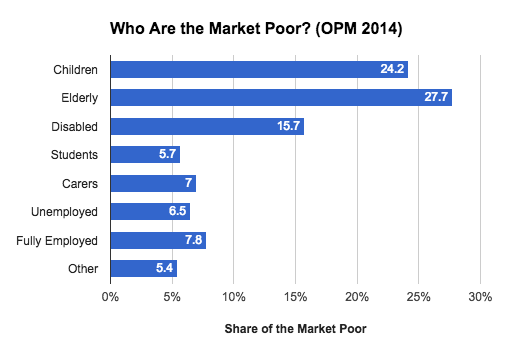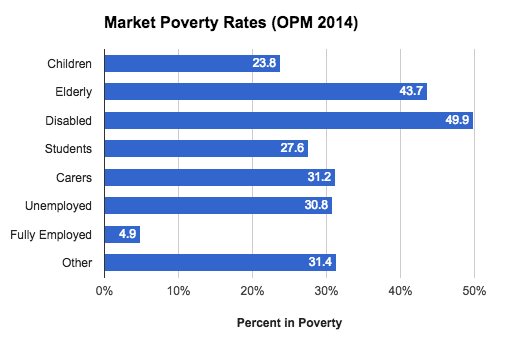I have a piece in The Washington Post that argues for a Universal Basic Income. The piece is part of a general UBI forum with lots of participants. I was solicited to provide a left-of-center perspective, and so that’s what I did.
The piece identifies two problems inherent in capitalist economic systems — employer coercion and deprivation — and then argues that a UBI might be able to fix them. The article is written so as to be as critical of capitalism as possible for having these defects because I thought that would be funny. The title was a bit misleading (so it goes in the publishing world) as it implies the argument is that a UBI would supplant capitalism, when in fact all I argue is that it would fix two discrete problems in capitalism.
Whenever you accuse capitalism of being coercive and causing patterns of deprivation, certain people lose their shit. This is especially true of the libertarian crowd, which is extremely invested in insisting that capitalism is actually super-duper freedom with no coercion at all.
People who don’t like this message (in my experience) like to dismiss it as some kind of fringe Marxist thing, but you can actually piece it together entirely from libertarian and libertarian-favored thinkers. Watch me do this below.
Coercion
In the coercion section, I start by arguing that the initial appropriation of property is built upon violent threats of force. Here is libertarian philosopher Matt Zwolinski making this exact same point:
If I put a fence around a piece of land that had previously been open to all to use, claim it as my own, and announce to all that I will use violence against any who walk upon it without my consent, it would certainly appear as though I am the one initiating force (or at least the threat of force) against others. I am restricting their liberty to move about as they were once free to do. I am doing so by threatening them with physical violence unless they comply with my demands. And I am doing so not in response to any provocation on their part but simply so that I might be better able to utilize the resource without their interference.
I then argue that this sort of appropriation destroys freedom of movement. This point is contained in the quote above. You can also find Nozick making it in Anarchy, State, Utopia:
It will be implausible to view improving an object as giving full ownership to it, if the stock of unowned objects that might be improved is limited. For an object’s coming under one persons’s ownership changes the situation of all others. Whereas previous they were at liberty (in Hohfeld’s sense) to use the object, they now no longer are.
Nozick puts it in terms of using an object, but when applied to land, you get the idea that coming into ownership of land removes people’s previously-existing liberty to roam across that land.
In many ways, the coercion point is very basic. In fact, libertarian Zwolinski in a recent paper claims that it’s totally uncontroversial, and goes on to briefly note that only Marxists truly oppose coercion:
I take it to be relatively uncontroversial that all systems of property rights are by their very nature coercive. It is an essential part of the point of property rights to be coercive—without that coercion, the right to exclude that is at the core of property rights is meaningless, and such rights could not provide the sort of stability and protection that makes them attractive in the first place.
Unlike Marxists, however, I do not believe that property rights’ coercive nature renders them necessarily unjust. Systems of property rights can be unjust if they fail to satisfy the Lockean proviso. But systems of property rights that satisfy the proviso are not unjust.
After pointing out that property is itself a violently coercive institution, I pivot to claiming that this ends up infecting employment relationships, causing them to be coercive as well. The argument here is pretty basic: when you own no productive property, you have no choice but to submit yourself to a propertied employer in order to live. Here is John Locke literally comparing this type of deprivation-fueled servanthood to slavery in the First Treatise:
And a man can no more justly make use of another’s necessity to force him to become his vassal by withholding that relief God required him to afford to the wants of his brother, than he that has more strength can seize upon a weaker, master him to his obedience, and, with a dagger at his throat, offer him death or slavery.
This is basically identical to the Marxist concept of wage slavery, except since it’s old-timey, Locke talks about vassals and lords instead of wage workers and bosses.
Deprivation
In the piece, I claim that capitalism creates persistent patterns of deprivation and focus specifically on those whose circumstances make it difficult or impossible to work. Here is Herbert Spencer (dubbed a “protolibertarian” by libertarians) making the exact same point in Social Statics:
The poverty of the incapable, the distresses that come upon the imprudent, the starvation of the idle, and those shoulderings aside of the weak by the strong, which leave so many “in shallows and in miseries,” are the decrees of a large, far-seeing benevolence. It seems hard that an unskilfulness which with all his efforts he cannot overcome, should entail hunger upon the artizan. It seems hard that a labourer incapacitated by sickness from competing with his stronger fellows, should have to bear the resulting privations. It seems hard that widows and orphans should be left to struggle for life or death. Nevertheless, when regarded not separately, but in connection with the interests of universal humanity, these harsh fatalities are seen to be full of the highest beneficence—the same beneficence which brings to early graves the children of diseased parents, and singles out the low-spirited, the intemperate, and the debilitated as the victims of an epidemic.
According to Spencer, capitalism will bring deprivation upon the unskillful artisan (unemployed people), laborers incapacitated by sickness (disabled people), and widows and orphans (survivors). Spencer thinks this is good and hopes the chronically unemployed, sick, disabled, widowed, and orphaned die, arguing that this would be beneficial for humanity. But what’s important here is only that he has identified a very specific pattern of deprivation: capitalism consistently impoverishes those whose capacity to work is quite limited.
Spencer was an obviously disgusting human being, but he was not a dummy. As I pointed out in Vox a few weeks ago, populations that are work-limited shoulder almost all of the market poverty (i.e. poverty without counting welfare benefits) in the US.
Taken together, 87.8% of those poor at the market distribution of income in the US are either children, elderly, disabled, students, carers, or the involuntarily unemployed (at least for part of the year).

In terms of poverty rates, you can see the Fully Employed (those working 50+ weeks a year) do quite well. Everyone else does very badly, with disabled people especially feeling the pain.

So Herbert Spencer was very correct. Capitalism does create very persistent patterns of deprivation that are directly related to the way the market distributes income (i.e. not to disabled people, retired people, those facing unemployment, etc.). This is why welfare benefits, which go almost entirely to these classes of people, exist.
Conclusion
So, you see, even a gang of libertarian and libertarian-approved thinkers — when properly arranged — can be marshaled to make all the usual anti-capitalist points about coercion and poverty. This is not surprising as these points are exactly correct and even libertarians sometimes tell the truth.